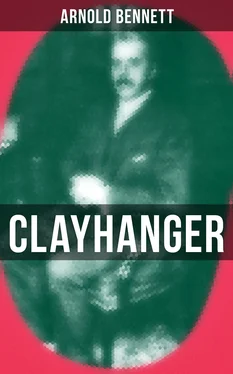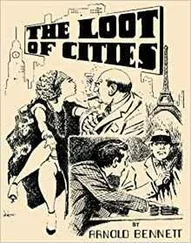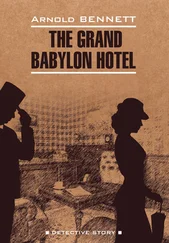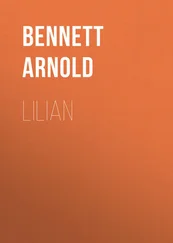The apprentice began to compose with his feet, his shoulders, his mouth, his eyebrows—with all his body except his hands, which nevertheless travelled spaciously far and wide.
“It’s not in seven year, nor in seventy, as you’ll learn, young son of a gun!” said Big James.
And, having unsettled the youth to his foundations with a bland thwack across the head, he resumed the composing stick and began again the exposition of the unique smooth movement which is the root of rapid type-setting.
“Here!” said Big James, when the apprentice had behaved worse than ever. “Us’ll ask Mr Edwin to have a go. Us’ll see what he’ll do.”
And Edwin, sheepish, had to comply. He was in pride bound to surpass the apprentice, and did so.
“There!” said Big James. “What did I tell ye?” He seemed to imply a prophecy that, because Edwin had saved the printing office from destruction two days previously, he would necessarily prove to be a born compositor.
The apprentice deferentially sniggered, and Edwin smiled modestly and awkwardly and departed without having accomplished what he had come to do.
By his own act of cool, nonchalant, unconsidered courage in a crisis, he had, it seemed, definitely proved himself to possess a special aptitude in all branches of the business of printer and stationer. Everybody assumed it. Everybody was pleased. Everybody saw that Providence had been kind to Darius and to his son. The fathers of the town, and the mothers, who liked Edwin’s complexion and fair hair, told each other that not every parent was so fortunate as Mr Clayhanger, and what a blessing it was that the old breed was not after all dying out in those newfangled days. Edwin could not escape from the universal assumption. He felt it round him as a net which somehow he had to cut.
Chapter Fourteen.
The Architect.
Table of Contents
One morning Edwin was busy in the shop with his own private minion, the paper boy, who went in awe of him. But this was not the same Edwin, though people who could only judge by features, and by the length of trousers and sleeves on legs and arms, might have thought that it was the same Edwin enlarged and corrected. Half a year had passed. The month was February, cold. Mr Enoch Peake had not merely married Mrs Louisa Loggerheads, but had died of an apoplexy, leaving behind him Cocknage Gardens, a widow, and his name painted in large letters over the word ‘Loggerheads’ on the lintel of the Dragon. The steam-printer had done the funeral cards, and had gone to the burial of his hopes of business in that quarter. Many funeral cards had come out of the same printing office during the winter, including that of Mr Udall, the great marble-player. It seemed uncanny to Edwin that a marble-player whom he had actually seen playing marbles should do anything so solemn as expire. However, Edwin had perfectly lost all interest in marbles; only once in six months had he thought of them, and that once through a funeral card. Also he was growing used to funeral cards. He would enter an order for funeral cards as nonchalantly as an order for butterscotch labels. But it was not deaths and the spectacle of life as seen from the shop that had made another Edwin of him.
What had changed him was the slow daily influence of a large number of trifling habitual duties none of which fully strained his faculties, and the monotony of them, and the constant watchful conventionality of his deportment with customers. He was still a youth, very youthful, but you had to keep an eye open for his youthfulness if you wished to find it beneath the little man that he had been transformed into. He now took his watch out of his pocket with an absent gesture and look exactly like his father’s; and his tones would be a reflection of those of the last important full-sized man with whom he had happened to have been in contact. And though he had not developed into a dandy (finance forbidding), he kept his hair unnaturally straight, and amiably grumbled to Maggie about his collars every fortnight or so. Yes, another Edwin! Yet it must not be assumed that he was growing in discontent, either chronic or acute. On the contrary, the malady of discontent troubled him less and less.
To the paper boy he was a real man. The paper boy accepted him with unreserved fatalism, as Edwin accepted his father. Thus the boy stood passive while Edwin brought business to a standstill by privately perusing the “Manchester Examiner.” It was Saturday morning, the morning on which the “Examiner” published its renowned Literary Supplement. All the children read eagerly the Literary Supplement; but Edwin, in virtue of his office, got it first. On the first and second pages was the serial story, by George MacDonald, W. Clark Russell, or Mrs Lynn Linton; then followed readable extracts from new books, and on the fourth page were selected jokes from “Punch.” Edwin somehow always began with the jokes, and in so doing was rather ashamed of his levity. He would skim the jokes, glance at the titles of the new books, and look at the dialogue parts of the serial, while business and the boy waited. There was no hurry then, even though the year had reached 1873 and people were saying that they would soon be at the middle of the seventies; even though the Licensing Act had come into force and publicans were predicting the end of the world. Morning papers were not delivered till ten, eleven, or twelve o’clock in Bursley, and on Saturdays, owing to Edwin’s laudable interest in the best periodical literature, they were apt to be delivered later than usual.
On this particular morning Edwin was disturbed in his studies by a greater than the paper boy, a greater even than his father. Mr Osmond Orgreave came stamping his cold feet into the shop, the floor of which was still a little damp from the watering that preceded its sweeping. Mr Orgreave, though as far as Edwin knew he had never been in the shop before, went straight to the coke-stove, bent his knees, and began to warm his hands. In this position he opened an interview with Edwin, who dropped the Literary Supplement. Miss Ingamells was momentarily absent.
“Father in?”
“No, sir.”
Edwin did not say where his father was, because he had received general instructions never to ‘volunteer information’ on that point.
“Where is he?”
“He’s out, sir.”
“Oh! Well! Has he left any instructions about those specifications for the Shawport Board School?”
“No, sir. I’m afraid he hasn’t. But I can ask in the printing office.”
Mr Orgreave approached the counter, smiling. His face was angular, rather stout, and harsh, with a grey moustache and a short grey beard, and yet his demeanour and his voice had a jocular, youthful quality. And this was not the only contradiction about him. His clothes were extremely elegant and nice in detail—the whiteness of his linen would have struck the most casual observer—but he seemed to be perfectly oblivious of his clothes, indeed, to show carelessness concerning them. His finger-nails were marvellously tended. But he scribbled in pencil on his cuff, and apparently was not offended by a grey mark on his hand due to touching the top of the stove. The idea in Edwin’s head was that Mr Orgreave must put on a new suit of clothes once a week, and new linen every day, and take a bath about once an hour. The man had no ceremoniousness. Thus, though he had never previously spoken to Edwin, he made no preliminary pretence of not being sure who Edwin was; he chatted with him as though they were old friends and had parted only the day before; he also chatted with him as though they were equals in age, eminence, and wealth. A strange man!
“Now look here!” he said, as the conversation proceeded, “those specifications are at the Sytch Chapel. If you could come along with me now—I mean now—I could give them to you and point out one or two things to you, and perhaps Big James could make a start on them this morning. You see it’s urgent.”
Читать дальше












